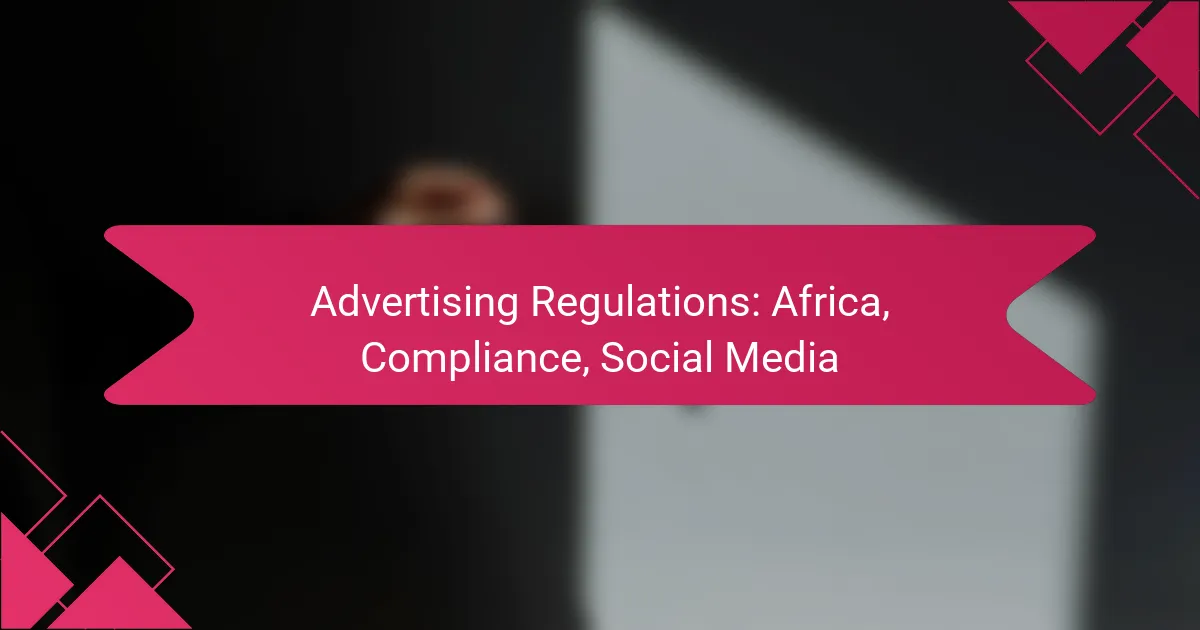Advertising regulations across Africa are diverse and designed to protect consumers from deceptive practices while promoting fair competition. Businesses must navigate these varying laws to ensure compliance, which includes understanding local guidelines, securing necessary approvals, and being transparent in their marketing efforts. Failure to adhere to these regulations can result in significant legal and financial penalties, making compliance essential for maintaining a positive market reputation.

What are the advertising regulations in Africa?
Advertising regulations in Africa vary significantly by country but generally aim to protect consumers from misleading information and ensure fair competition. These laws govern various aspects of advertising, including content, placement, and the use of personal data in marketing strategies.
Overview of advertising laws
Advertising laws in Africa typically include provisions against false advertising, misleading claims, and the promotion of harmful products. Many countries require advertisements to be truthful and substantiated, with penalties for non-compliance ranging from fines to bans on advertising. Understanding these laws is crucial for businesses operating in multiple jurisdictions.
In addition to general advertising standards, some nations have specific regulations regarding advertising to children, alcohol, and tobacco products. Companies must be aware of these nuances to avoid legal repercussions.
Key regulatory bodies
Each African country has its own regulatory bodies responsible for overseeing advertising practices. For example, in South Africa, the Advertising Standards Authority (ASA) enforces compliance with advertising codes. In Nigeria, the Advertising Practitioners Council of Nigeria (APCON) plays a similar role, ensuring that advertisements meet established guidelines.
These regulatory bodies often provide resources and guidelines for businesses to help them navigate the complex landscape of advertising regulations. Engaging with these organizations can aid in maintaining compliance and avoiding potential legal issues.
Country-specific regulations
Country-specific regulations can differ widely across Africa. For instance, in Kenya, the Advertising Standards Board requires all advertisements to be pre-approved, while in Ghana, the National Communications Authority regulates advertising content to protect consumers.
Businesses should conduct thorough research on the specific advertising laws in each country where they operate. This includes understanding local languages, cultural sensitivities, and any unique restrictions that may apply to their products or services.

How to ensure compliance with advertising regulations?
To ensure compliance with advertising regulations in Africa, businesses must understand and adhere to local laws governing marketing practices. This involves familiarizing themselves with specific guidelines, obtaining necessary approvals, and maintaining transparency in their advertising efforts.
Steps for compliance
Start by researching the advertising regulations specific to the countries where you operate. Each nation may have distinct rules regarding content, claims, and disclosures. Next, develop clear advertising policies that align with these regulations and ensure all marketing materials are reviewed for compliance before publication.
Consider implementing a compliance checklist that includes verifying claims, ensuring proper disclosures, and obtaining necessary approvals from regulatory bodies. Regular training for your marketing team on these regulations can also help maintain compliance.
Common compliance pitfalls
One common pitfall is making exaggerated claims that cannot be substantiated, which can lead to legal repercussions. Ensure that all statements in your advertisements are truthful and backed by evidence. Another issue is neglecting to include required disclaimers or disclosures, which can mislead consumers and attract penalties.
Additionally, failing to stay updated on changing regulations can result in unintentional violations. Regularly review and adjust your advertising strategies to align with any new laws or guidelines that may emerge in your target markets.

What are the implications of non-compliance?
Non-compliance with advertising regulations in Africa can lead to serious repercussions for businesses, including legal and financial consequences. Companies must adhere to these regulations to avoid penalties and maintain their reputation in the market.
Legal consequences
Legal consequences of non-compliance can include lawsuits, cease and desist orders, and even criminal charges in severe cases. Regulatory bodies in various African countries enforce advertising laws strictly, and companies found in violation may face litigation initiated by competitors or consumers.
For example, if a company falsely advertises a product, it may be subject to legal action under consumer protection laws. This can result in mandatory corrective advertising or public apologies, further damaging the brand’s credibility.
Financial penalties
Financial penalties for non-compliance can vary widely depending on the jurisdiction and severity of the violation. Fines can range from a few thousand to several million local currency units, significantly impacting a company’s bottom line.
In some cases, businesses may also be required to reimburse consumers or pay damages, which can add to the financial burden. It’s crucial for companies to budget for compliance costs and potential penalties to mitigate risks associated with advertising practices.

How do social media platforms regulate advertising in Africa?
Social media platforms in Africa regulate advertising through a combination of community standards, local laws, and specific guidelines tailored to the region. These regulations ensure that advertisements are truthful, non-deceptive, and culturally appropriate, while also addressing issues like privacy and consumer protection.
Platform-specific guidelines
Each social media platform has its own set of advertising guidelines that advertisers must follow. For instance, Facebook and Instagram emphasize the need for ads to be clear and not misleading, while Twitter has strict rules against promoting harmful products or services. Advertisers should familiarize themselves with these guidelines to avoid penalties or ad removals.
In Africa, platforms may also adapt their policies to align with local cultural norms and legal requirements. This means that what is acceptable in one country may not be in another. Advertisers should consult the specific guidelines for each platform and region to ensure compliance.
Content moderation practices
Content moderation on social media platforms involves reviewing advertisements to ensure they meet established guidelines. Automated systems often flag potentially problematic ads, which are then reviewed by human moderators. This process helps maintain the integrity of the platform and protects users from misleading content.
Advertisers should be aware that content moderation can vary significantly by platform and region. For example, some platforms may have a more rigorous review process in countries with strict advertising laws. Understanding these practices can help advertisers craft compliant and effective ads.

What are the best practices for advertising on social media?
Effective social media advertising requires understanding your audience, creating engaging content, and adhering to local regulations. By focusing on these areas, businesses can enhance their visibility and compliance while driving engagement.
Target audience engagement
Engaging your target audience is crucial for successful social media advertising. Start by researching demographics, interests, and online behavior to tailor your messages effectively. Utilize tools like audience insights available on platforms such as Facebook and Instagram to refine your targeting.
Consider using interactive content, such as polls or quizzes, to foster participation. This not only boosts engagement but also provides valuable feedback on audience preferences. Regularly analyze engagement metrics to adjust your strategies based on what resonates most with your audience.
Ad content strategies
Creating compelling ad content is essential for capturing attention on social media. Focus on high-quality visuals and concise messaging that clearly communicates your value proposition. Use storytelling techniques to connect emotionally with your audience, making your ads more relatable.
Incorporate a mix of content types, such as videos, carousels, and user-generated content, to keep your audience engaged. Ensure that all content complies with local advertising regulations, such as avoiding misleading claims and respecting copyright laws. Regularly test different formats and messages to identify what drives the best results.

What trends are shaping advertising regulations in Africa?
Advertising regulations in Africa are increasingly influenced by digital transformation and the rise of social media platforms. As more consumers engage online, regulators are adapting to ensure compliance and protect users from misleading practices.
Emerging digital advertising trends
The shift towards digital advertising is significant across Africa, with many businesses leveraging social media for marketing. This trend has led to a surge in influencer marketing, where brands collaborate with social media personalities to reach targeted audiences effectively.
As digital advertising grows, so do concerns about transparency and authenticity. Regulators are focusing on ensuring that advertisements are clearly identifiable and that influencers disclose paid partnerships to maintain consumer trust.
Impact of technology on regulations
Technology is reshaping advertising regulations by enabling more sophisticated tracking and analytics. This allows companies to tailor their ads more precisely, but it also raises privacy concerns that regulators must address. Compliance with data protection laws, such as the General Data Protection Regulation (GDPR) in certain African countries, is becoming crucial.
Additionally, the rise of artificial intelligence in ad targeting necessitates clear guidelines to prevent discrimination and ensure fairness. Advertisers must stay informed about evolving regulations to avoid penalties and maintain ethical standards in their campaigns.

How can businesses adapt to changing regulations?
Businesses can adapt to changing regulations by implementing proactive strategies that ensure compliance and mitigate risks. This involves regular assessments of advertising practices and staying updated on the evolving legal landscape across different African countries.
Regular compliance audits
Conducting regular compliance audits is essential for businesses to identify and rectify potential regulatory issues in their advertising strategies. These audits should evaluate marketing materials, social media content, and promotional campaigns against local laws and industry standards.
Companies should establish a schedule for audits, ideally quarterly or bi-annually, depending on the frequency of regulatory changes in their specific region. Engaging legal experts familiar with local advertising regulations can enhance the effectiveness of these audits.
Staying informed on regulatory updates
Staying informed about regulatory updates is crucial for businesses operating in the dynamic advertising landscape of Africa. This can be achieved through subscribing to industry newsletters, joining professional associations, and participating in relevant workshops or seminars.
Additionally, businesses should designate a compliance officer or team responsible for monitoring changes in advertising laws and regulations. Utilizing digital tools and platforms that aggregate regulatory news can streamline this process and ensure timely responses to new requirements.










